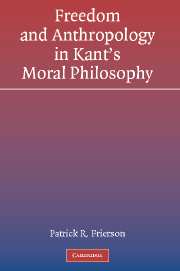Book contents
- Frontmatter
- Dedication
- Contents
- Preface
- Introduction: A Problem with Kant’s Moral Anthropology
- I The Problem
- 1 The Asymmetry in Kant’s Conception of Freedom
- 2 Anthropology as an Empirical Science
- 3 The Moral Importance of Kant’s “Pragmatic” Anthropology
- 4 Moral Anthropology in Contemporary Neokantian Ethics
- II The Solution
- 5 Transcendental Idealism, Radical Evil, and Moral Anthropology
- 6 Moral Influence on Others
- Epilogue: Incorporating Moral Anthropology and Defending Kantian Moral Philosophy
- Notes
- References
- Index of Kant’s Works
- Name Index
- Subject Index
4 - Moral Anthropology in Contemporary Neokantian Ethics
Published online by Cambridge University Press: 28 July 2009
- Frontmatter
- Dedication
- Contents
- Preface
- Introduction: A Problem with Kant’s Moral Anthropology
- I The Problem
- 1 The Asymmetry in Kant’s Conception of Freedom
- 2 Anthropology as an Empirical Science
- 3 The Moral Importance of Kant’s “Pragmatic” Anthropology
- 4 Moral Anthropology in Contemporary Neokantian Ethics
- II The Solution
- 5 Transcendental Idealism, Radical Evil, and Moral Anthropology
- 6 Moral Influence on Others
- Epilogue: Incorporating Moral Anthropology and Defending Kantian Moral Philosophy
- Notes
- References
- Index of Kant’s Works
- Name Index
- Subject Index
Summary
Neokantian moral theorists have recently begun to pay more attention to Kant's moral anthropology. Robert Louden devotes the longest chapter of Kant's Impure Ethics (Louden 2000, cf. Louden 1986) to the treatment of the role of anthropology in the “second part” of Kant's moral theory. And G. Felicitas Munzel devotes considerable portions of her Kant's Conception of Moral Character (Munzel 1999) to pointing out the insights that can be gleaned from the anthropology for Kant's moral theory. Aside from these direct treatments of anthropology, many of the most influential contemporary appropriations of Kant's moral theory have shown increasing attention to various little-known gems of anthropological reflection in Kant. Nancy Sherman and others have pointed out the important role of the emotions in Kant's moral philosophy, drawing in large part from the Anthropology and the most anthropological sections of Kant's other writings. Allen Wood and Sharon Anderson-Gold, in their attention to the social dimension of ethical life (Wood 1999; Anderson-Gold 2001), draw from anthropological considerations in Kant's Religion and historical essays. Paul Guyer's rich accounts of the experience of freedom also draw extensively on anthropological considerations (Guyer 1993). And this just scratches the surface of the explosion of attention to anthropology in contemporary Kantian moral philosophy.
In part, this attention is a response to challenges from Kant's critics, especially those sympathetic to contemporary virtue ethics, who often accuse Kantian moral theory of paying insufficient attention to character, virtue, and the richness of human life. In part, it is the result of the recent publication in Germany of Kant's Lectures on Anthropology (vol. 25 of the Academy Edition of Kant's works). And in part it is simply a long-overdue recognition of the importance that Kant himself gave to anthropology. These developments are welcome. They flesh out a moral theory that though provocative and appealing seemed to have lost touch with human life.
But this enrichment of moral theory through anthropology has led some Kantians to neglect the central importance of freedom in Kant's moral theory. Even those who continue to attend to Kant's theory of freedom while seeking to incorporate anthropological insights fail to explain adequately how one can coherently integrate moral anthropology into Kant's theory of freedom.
- Type
- Chapter
- Information
- Freedom and Anthropology in Kant's Moral Philosophy , pp. 68 - 92Publisher: Cambridge University PressPrint publication year: 2003



